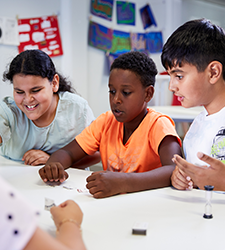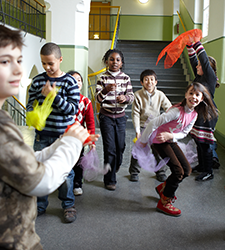Projects

MoMoView
The aim of the project is to investigate individual differences in visual perception and memory for scenes, in particular how people of different ages remember previously viewed scenes and how gaze patterns differ between viewing and recalling scenes.

MORAL
The research project MORAL investigates the socio-moral development of children and adolescents with a strong focus on intergroup processes and social cognition. Another focus of the project is the training of educators and teachers regarding social exclusion among children and adolescents.

MotivO
Project MotivO aims at investigating and comparing motivational aspects of reading achievement across orthographies (German vs. Hebrew). Within the context of a cooperation project, German and Israeli 2nd and 4th Graders will be compared regarding their reading motivation and reading achievement in a cross-language research design to detect positive or negative feelings towards reading as well as changes across time.

MuKi
Investigating emotional expectation and appraisal processes in children aged 8-12

MultiDiskurs
The project aims to account for patterns of variation in the processing of linguistic structures in discourse. In particular, we investigate how bilingual children ranging in age from 8 to 12 integrate morphosyntactic and discourse information, for example by using eye-tracking experiments. Among the factors that contribute to individual variation, we explore the role of cross-linguistic influence, differences in bilingual profiles in terms of language and literacy exposure, individual cognitive skills and bilinguals’ ability to share discourse strategies across their two languages.

NEDA
The project NEDA investigates the relationship between the development of reading and spelling skills and the development of neural auditory processing in elementary school children.

NEIS
Project NEIS is concerned with the development of self-regulatory skills – the ability to perform goal-oriented behavior – in children aged between 5 and 8 years.

NeuroBind
The project NeuroBind investigates the neural bases of the attachment system in children with different attachment styles using neuroimaging techniques (structural and functional magnetic resonance imaging). To activate their attachment system, children are shown different attachment relevant pictures and are asked to imagine themselves in secure and dangerous social situations. Correlations between brain activity and emotional reactions in response to those specific social situations are analyzed.

PaSS
The project PaSS evaluates the social validity of school-based prevention programmes that aim to foster social skills and reduce aggressive behaviour.

PIVOTAL
As neuroscientific knowledge about brain function accumulates, it becomes increasingly important to derive a set of overarching general principles about how the human brain works. One promising approach is the concept of predictive coding, which posits that the brain functions like a prediction machine; internal models in the brain predict future states against which incoming […]